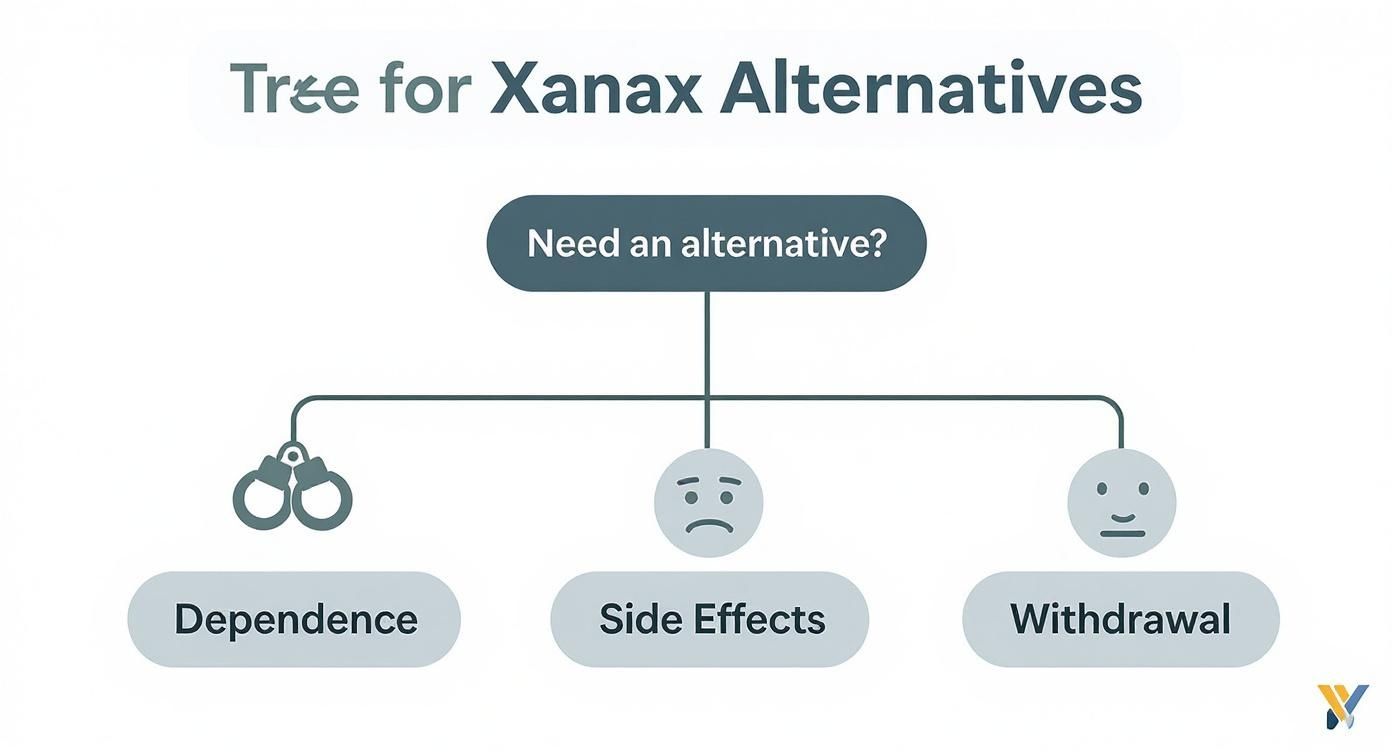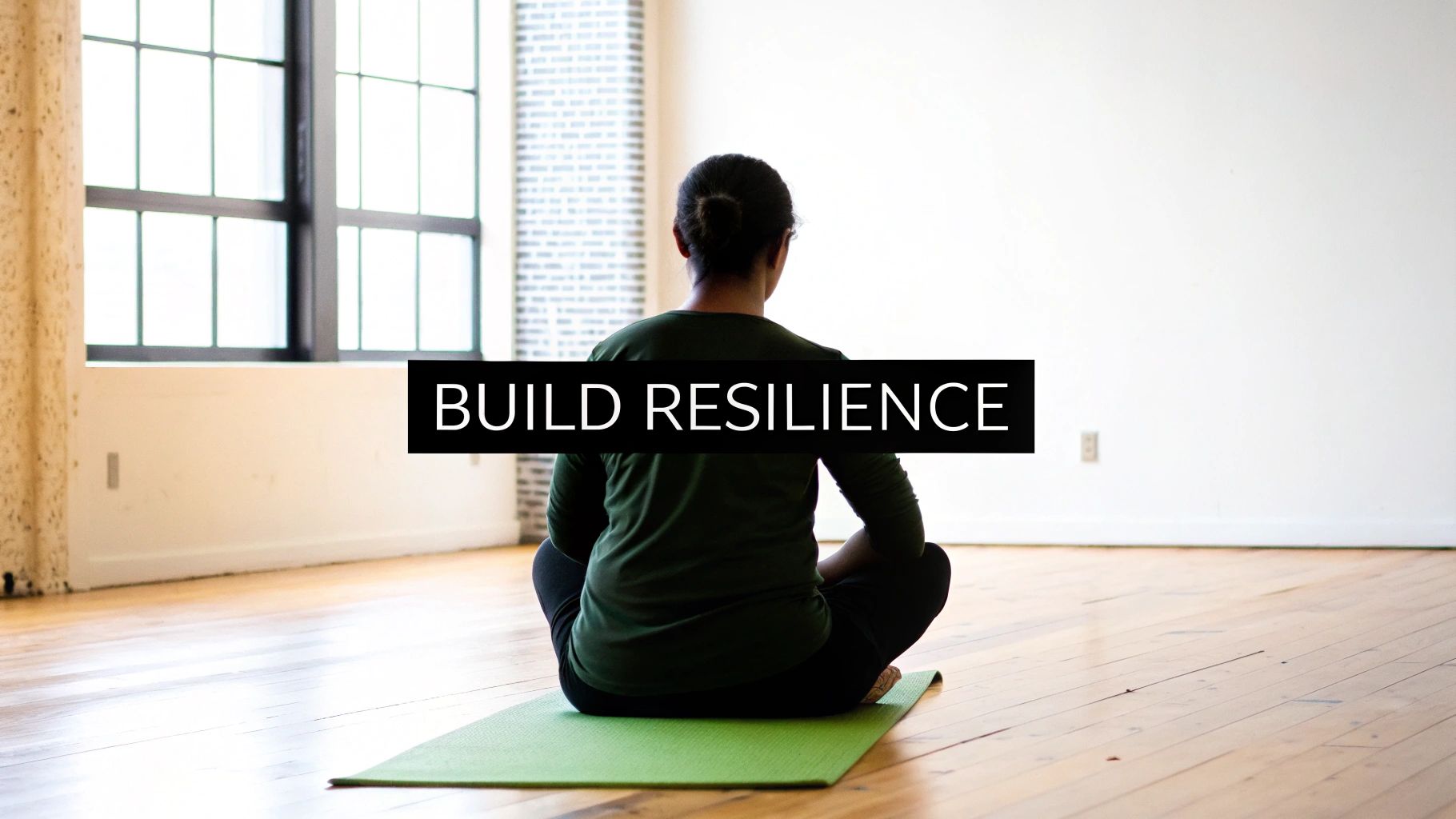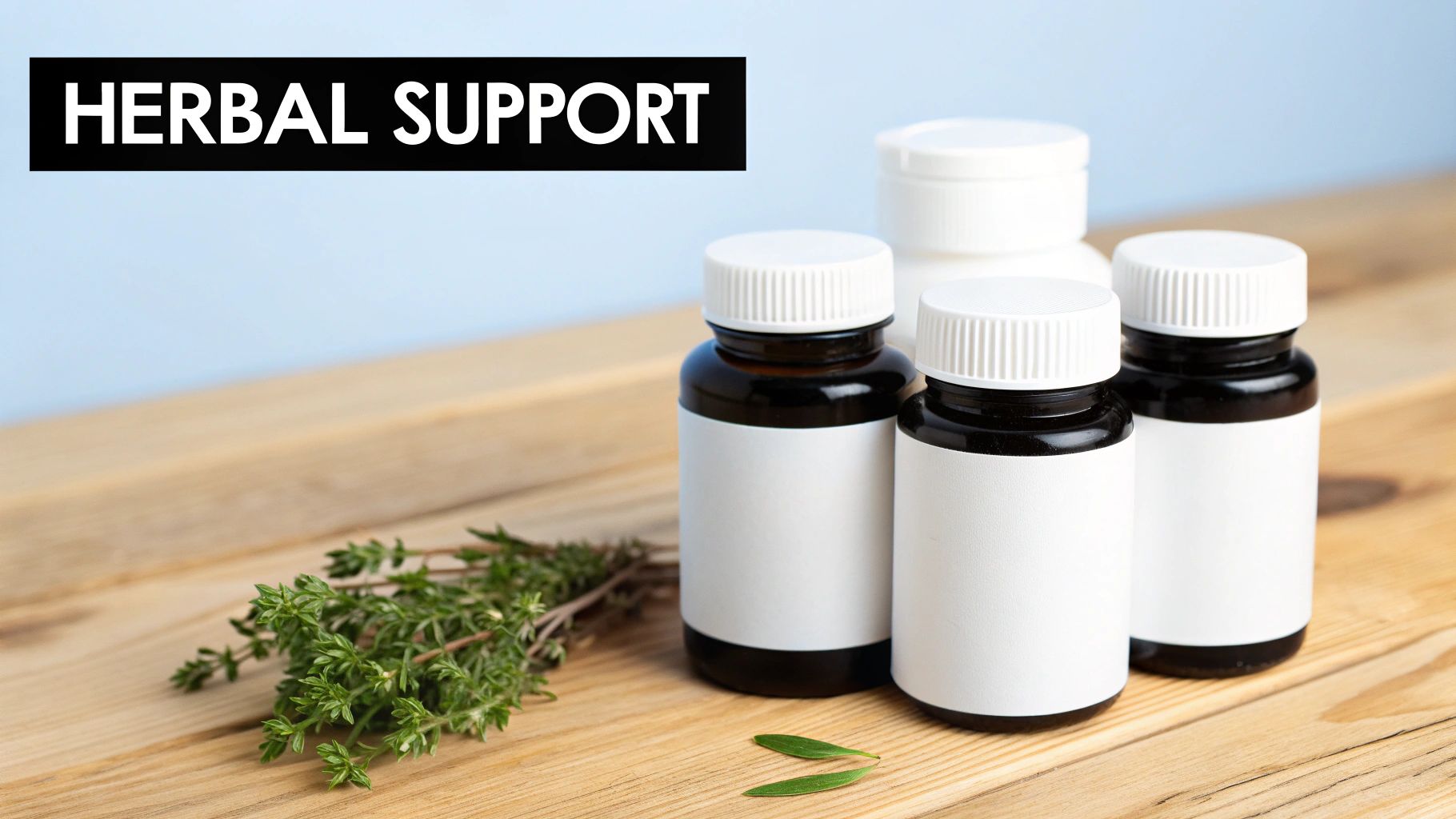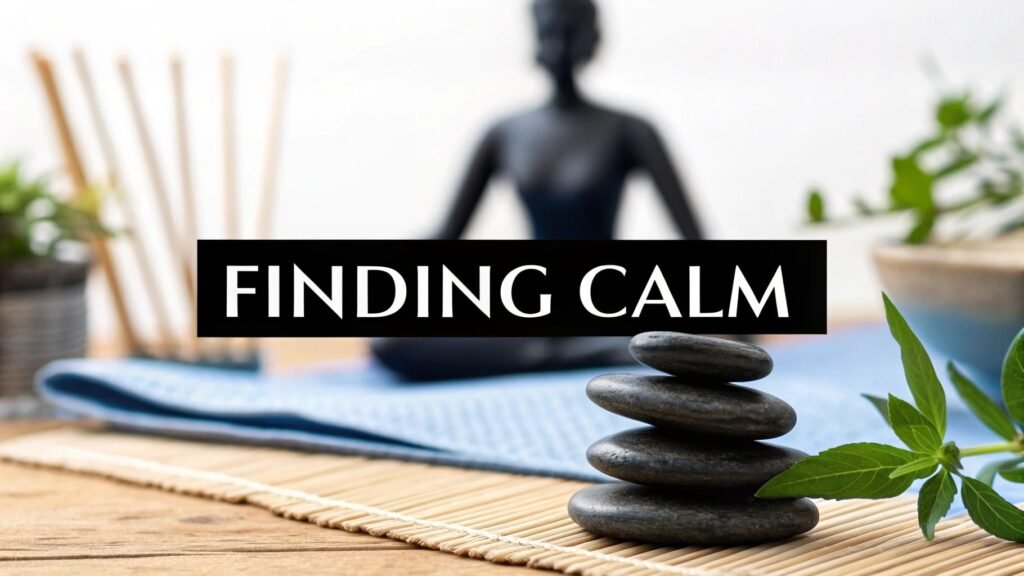When anxiety hits hard and fast, Xanax can feel like a lifesaver. It works quickly to calm the storm, which is why it's so often prescribed for panic attacks and severe anxiety. But that immediate relief can come at a steep price.
The search for an alternative to Xanax often begins when the downsides start to outweigh the benefits. It's a powerful medication, but one that carries significant long-term risks that simply can't be ignored.
Why Look for an Alternative to Xanax?
Let's be clear: for some people in acute distress, Xanax (the brand name for alprazolam) is an effective tool. Its ability to bring immediate calm is undeniable. The problem is what happens next.
The biggest issue is the high risk of dependence and addiction. The body adapts quickly, and soon, you might need more of the drug to get the same calming effect. This tolerance can create a dangerous cycle that’s tough to escape. The numbers tell a stark story: back in 2012, doctors wrote over 49 million prescriptions for alprazolam in the U.S. alone. If you're curious about the scale of this, you can discover more about the benzodiazepine market and its broader impact.
The Risks Go Beyond Addiction
Dependence is a serious concern, but it's not the only one. Many people find the side effects interfere with their quality of life in significant ways.
- Cognitive Fog: It's common to struggle with memory, focus, and just feeling mentally sharp.
- Emotional Numbness: Some people describe feeling disconnected from their emotions, as if they're living behind a glass wall.
- A Brutal Withdrawal: Getting off Xanax can be incredibly difficult. The withdrawal symptoms—like rebound anxiety, insomnia, and in severe cases, seizures—often require professional medical supervision.
Xanax is a bandage, not a cure. It silences the alarm but doesn't put out the fire. Real, sustainable relief means getting to the root of the anxiety, and that’s where non-drug strategies become essential for building true mental resilience.
This guide is designed to walk you through those strategies. We’ll look at everything from mindset shifts and herbal formulas to lifestyle changes, giving you the information you need to build a toolkit for managing anxiety without relying on a temporary fix.
Comparing Non-Pharmaceutical Anxiety Treatments
When you're looking for anxiety relief, it’s easy to feel pulled in two different directions. On one hand, there's the immediate, powerful calm of a medication like Xanax. On the other, there are more holistic, non-pharmaceutical approaches that promise sustainable, long-term wellness.
The core difference really comes down to philosophy and timeline. Xanax is a rapid chemical intervention, designed for acute situations. Holistic methods, in contrast, work to systematically build your body's and mind's resilience over time by getting to the root of the problem.
Key Factors To Consider
Your decision will likely pivot on three critical factors: how quickly you need relief, the risk of dependence, and the potential for lasting change. Xanax is unmatched in its speed, but this comes with a very real and high risk of dependency and a difficult withdrawal process.
Alternative approaches, like lifestyle adjustments or mind-body practices, demand more patience and consistency. The results aren't instant, but they build a foundation for mental well-being without the risk of addiction.
This is a common journey for many. People often start seeking alternatives because they're tired of the side effects or the cycle of dependence that can come with benzodiazepines.

As the infographic shows, the move away from pharmaceuticals is often driven by a deep desire to break free from dependency and its side effects. It’s a conscious shift from just managing symptoms to actively building a healthier, more resilient state of mind.
The most significant distinction lies in empowerment. While Xanax manages symptoms reactively, non-pharmaceutical approaches equip you with the skills and physiological balance to proactively manage anxiety, giving you greater control over your mental health.
Xanax vs Holistic Alternatives A Comparative Snapshot
To lay it all out clearly, this table offers a snapshot comparison of Xanax against the main categories of holistic strategies. Think of it as a guide to help you see where each approach shines.
It's important to note that the best path forward isn't always one or the other; many people find success by integrating different methods, always under the guidance of a qualified healthcare professional. For a more detailed exploration of these options, you might want to look into the variety of natural remedies for anxiety and how they work.
| Treatment | Mechanism of Action | Time to Effect | Dependence Risk | Best For |
|---|---|---|---|---|
| Xanax | Enhances GABA neurotransmitter activity to produce rapid sedation. | 15-30 minutes | Very High | Acute panic attacks or severe, short-term anxiety episodes under strict medical supervision. |
| Mind-Body Therapies | Retrains thought patterns and nervous system responses (e.g., CBT, meditation). | Weeks to months | None | Building long-term coping skills and addressing the root causes of chronic anxiety. |
| Herbal Supplements | Modulates neurotransmitters or stress hormones (e.g., Kava, Ashwagandha). | Days to weeks | Low to Moderate | Mild to moderate anxiety, often as a bridge away from pharmaceuticals or for situational stress. |
| Lifestyle Changes | Regulates brain chemistry and nervous system through diet, exercise, and sleep. | Weeks to months | None | Establishing a foundational layer of mental wellness and preventing future anxiety spikes. |
Ultimately, this comparison highlights the fundamental trade-off between immediate relief and long-term stability. Understanding these differences is the first step toward making an informed choice that truly aligns with your health goals.
Building Resilience With Mind-Body Therapies
Some alternatives to Xanax work by adjusting your body's chemistry, but another powerful set of options focuses on something more fundamental: retraining your brain's response to stress. Mind-body therapies aren't a quick fix. Think of them as skill-building practices that create lasting resilience. This approach empowers you to manage anxiety at its source, rather than just covering up the symptoms.
Unlike the immediate calm from a pill, these methods demand consistent practice. The payoff? Profound, sustainable benefits without the risk of dependence. The real goal is to forge a new relationship with anxious thoughts and feelings.
Retraining Anxious Thought Patterns With CBT
Cognitive Behavioral Therapy (CBT) stands out as one of the most researched and effective therapies for anxiety disorders. It’s built on a straightforward idea: your thoughts, feelings, and behaviors are all connected. By learning to identify and challenge negative or irrational thought patterns, you can fundamentally change how you feel and act.
Let's say you have a major work presentation coming up. An anxious thought might be, "I'm going to fail, and everyone will think I'm incompetent." This single thought can fuel feelings of panic and lead to avoidance behaviors like procrastination.
CBT teaches you how to step in and break that cycle. You learn to question the thought: "Is it really true that I will fail? What's the evidence? What's a more realistic outcome?" This process doesn't magically erase the stress, but it stops the catastrophic thinking that can be so paralyzing.
The skills you gain in CBT become a permanent part of your mental toolkit, making it an excellent long-term alternative to Xanax.
Cultivating Awareness Through Mindfulness and Meditation
Mindfulness is simply the practice of paying attention to the present moment without judgment. It involves observing your thoughts, physical sensations, and emotions as they come and go, rather than getting swept away by them. For managing anxiety, this sense of detachment is a game-changer.
One highly effective, evidence-backed therapy is Mindfulness-Based Stress Reduction (MBSR), which provides practical techniques for navigating stress and illness. Through practices like guided meditation, body scans, and gentle yoga, MBSR helps you recognize anxiety triggers and respond with calm awareness instead of knee-jerk panic.
- Guided Meditation: Helps focus your attention, interrupting the constant flow of racing, anxious thoughts.
- Body Scans: Tune you into physical tension you might be holding unconsciously, giving you a chance to release it.
- Mindful Breathing: Works as a powerful anchor to the present, calming your nervous system in real-time.

These practices build resilience by training your brain to stay grounded, even when facing stressors. Similar principles are found in other traditional practices, and understanding if acupuncture is good for anxiety shows how different holistic approaches can also target the nervous system. Ultimately, mind-body therapies give you the tools to build a strong foundation for mental well-being and offer a path to lasting relief.
Evaluating Herbal and Supplemental Support
When people look for an alternative to Xanax, the world of herbal remedies and dietary supplements is often one of the first places they turn. These options don't work like pharmaceuticals; instead of inducing rapid sedation, they typically help the body modulate its own stress response systems over time. You won’t get the immediate effect of a Xanax, but with consistent use, supplements can offer a gentler, more gradual path to managing anxiety.
The global market for benzodiazepines is massive—it's projected to reach USD 5.4 billion by 2035, largely because of the rising prevalence of mental health conditions. Yet, this growth is shadowed by widespread concern over dependency, which is exactly why so many are searching for safer, non-addictive treatments. You can discover more insights about the benzodiazepine drug market and the growing demand for alternatives.
This is precisely why natural options like adaptogens and amino acids have stepped into the spotlight.
Popular Evidence-Backed Supplements
Before we dive in, a crucial reminder: always approach supplements with an evidence-based mindset and speak with a healthcare professional before adding anything new to your routine. Their effectiveness isn't universal, and there's always a risk of interaction with other medications.
- Kava (Piper methysticum): Well-known for its calming properties, some studies show Kava can reduce anxiety by influencing GABA neurotransmitter pathways. This is similar to Xanax, but it works through a different mechanism. While often used for situational stress, it carries warnings about potential liver toxicity, so medical guidance is non-negotiable.
- L-theanine: This is the amino acid found in green tea that promotes a sense of relaxation without making you drowsy. It works by boosting calming brain chemicals like GABA, serotonin, and dopamine, making it a great option for taking the edge off daily stress or improving focus when you're under pressure.
- Valerian Root (Valeriana officinalis): Most people know Valerian Root as a sleep aid, but it also has mild anxiety-reducing effects. It's thought to interact with GABA receptors to create a calming sensation, making it a solid choice for people whose anxiety is tangled up with insomnia.
The Role of Adaptogens like Ashwagandha
Adaptogens are a fascinating class of herbs that help your body become more resilient to physical, chemical, and biological stress. Rather than hitting a single target, they work holistically to restore balance throughout your system. When considering herbal and supplemental support, many people find natural relief through adaptogens like Ashwagandha for stress relief.

Ashwagandha (Withania somnifera) is one of the most well-researched adaptogens out there. Its power lies in helping to regulate cortisol, the body's primary stress hormone. By reining in elevated cortisol levels, it can dial down the physiological symptoms of chronic stress and anxiety, fostering a sense of stability over the long term.
This is a fundamentally different approach from Xanax, which offers fast, acute relief but does nothing to address the underlying hormonal imbalances that come with chronic stress.
For a deeper look at how these compounds can fit into a comprehensive wellness strategy, you can explore these herbal remedies for anxiety and stress. Ultimately, supplements offer a proactive way to build resilience—a stark contrast to the reactive nature of benzodiazepines.
Lifestyle Strategies for Lasting Anxiety Relief
While specific therapies and supplements can offer targeted support, sometimes the most powerful alternatives to Xanax are the ones you build into your daily life. The foundations of wellness—how you move, what you eat, and how you rest—have a direct line to your brain chemistry and nervous system. This is a proactive, whole-body approach that builds a strong defense against anxiety, a stark contrast to the reactive nature of taking a pill.
Consistent physical activity is one of the most effective tools we have for managing anxiety. Aerobic exercise, even a brisk walk, triggers a release of endorphins, your body's natural mood lifters. In fact, research shows it can be as effective as some medications for mild anxiety. This isn't just about a temporary mood boost; regular exercise actually helps remodel the brain, encouraging new neuron growth in the very areas that regulate mood.
Beyond the gym, what you put on your plate plays a significant role in your mental well-being.

Restorative Practices for Nervous System Regulation
Just as crucial as diet and exercise is the quality of your sleep. Poor sleep is a massive driver for anxiety, creating a vicious cycle where worry disrupts rest, and the lack of rest then amplifies worry. Simply creating a consistent sleep schedule, putting away screens before bed, and making your bedroom dark and cool can make a world of difference in your ability to handle daily stressors.
Physical therapies designed to calm the nervous system also provide profound benefits. Practices like acupuncture and therapeutic massage have been clinically shown to reduce anxiety. Acupuncture, for example, stimulates specific points on the body to regulate energy flow and dial down the sympathetic nervous system—your body's "fight or flight" mechanism.
The core idea behind these lifestyle strategies is building physiological resilience. Instead of waiting for anxiety to strike, you're actively creating an internal environment where it's less likely to take hold. That's a powerful long-term alternative to Xanax.
This shift from just managing symptoms to building foundational health is really gaining momentum, especially as more people become aware of the risks tied to benzodiazepines. The growing demand for treatments without addiction potential has pushed more research into safer options. You can learn more about trends in the benzodiazepine market and see how the conversation is moving toward sustainable mental health solutions.
By prioritizing these daily habits, you're not just fighting anxiety; you're equipping yourself with lasting strategies for a calmer, more balanced life.
Choosing the Right Path for Your Well-Being
Figuring out how to manage your anxiety means getting really honest about your personal needs and what you hope to achieve. There’s no single best alternative to Xanax; the right path is a strategy you build for your specific situation. In my experience, the most successful approaches are almost always integrated, weaving together several non-pharmaceutical methods.
Start by thinking about your biggest challenge. Are you dealing with sudden, intense panic attacks that come out of nowhere? Or is it more of a constant, simmering worry that follows you through your day? Each of these calls for a different set of tools from your wellness toolkit.
Matching Strategies to Your Needs
When you're in the throes of acute anxiety, you need something that works fast. Xanax offers rapid chemical sedation, but it’s entirely possible to find a similar sense of calm without the risks of dependency.
-
For Acute Panic: Immediate relief often comes from techniques that directly soothe your nervous system. Mindful breathing exercises can work wonders in the moment. Certain fast-acting herbal supplements, like Kava, can also be effective, but they absolutely must be used under professional supervision.
-
For Chronic Anxiety: If you're dealing with long-term anxiety, the focus shifts to building resilience. This is about laying a solid foundation with consistent lifestyle changes—think regular exercise and good, restorative sleep. Pairing this with mind-body therapies like Cognitive Behavioral Therapy (CBT) can help you fundamentally change the anxious thought patterns that keep you stuck.
The real goal is to shift from just reacting to your symptoms to proactively managing your well-being. Xanax might silence the alarm bell, but a holistic plan is about dismantling the system that keeps pulling the alarm in the first place.
Putting together your personal plan should always be done in partnership with a healthcare provider you trust. They can help you safely combine different strategies, track how you're doing, and fine-tune your approach as you evolve. This kind of informed, collaborative process puts you back in the driver's seat of your mental health journey, creating a sustainable path to lasting relief.
Frequently Asked Questions
Making the move away from a medication like Xanax naturally brings up a lot of questions. We've gathered some of the most common concerns to give you clear, straightforward answers about finding a safer, more sustainable alternative to Xanax.
Are Natural Alternatives As Effective As Xanax?
This really comes down to your goal. If you're looking for immediate relief from an acute panic attack, Xanax is hard to beat for sheer speed.
But when the goal is to build long-term resilience and manage chronic anxiety, many non-pharmaceutical approaches, especially things like Cognitive Behavioral Therapy (CBT), have proven to be far more effective and sustainable. Natural alternatives work by getting to the root of the problem, not just masking the symptoms. Their success is measured in lasting wellness, not just a temporary calm.
How Long Does It Take for Alternatives to Work?
Patience is key here. Unlike Xanax, which can kick in within 30 minutes, natural strategies are about building a solid foundation over time.
- Mind-Body Therapies (CBT, Mindfulness): You’ll likely start feeling a shift within a few weeks, but the truly significant changes often come after several months of consistent practice.
- Herbal Supplements (Ashwagandha, L-theanine): Give these a few days to a few weeks of daily use to really gauge their full effect.
- Lifestyle Changes (Exercise, Diet): The mood-boosting effects can start within a couple of weeks, but they become much more powerful and stable over months of sticking with it.
Can I Stop Taking Xanax and Start an Alternative Right Away?
Under no circumstances. Quitting Xanax cold turkey is incredibly dangerous. It can trigger severe withdrawal symptoms, including intense rebound anxiety, insomnia, and even life-threatening seizures. Any plan to change your medication must be done under the close supervision of a qualified healthcare professional.
A safe transition always involves a gradual tapering schedule designed by your doctor. While you're slowly reducing your dose, you can begin incorporating natural alternatives. This supports your mind and body, making the entire process smoother and more successful.
This careful, guided approach is all about keeping you safe while you build a new, healthier foundation for managing anxiety.
At Eric Tsai Acupuncture and Herbs, we specialize in creating personalized, integrative treatment plans that combine ancient wisdom with modern understanding to help you find lasting relief from anxiety. Learn more about our approach at https://drerictsai.com.

